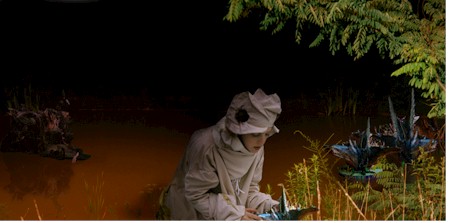
illustration by british artist/architect mary mattingly
As I suspected when I wrote about Beth’s list of 30 Thoughts in 30 Minutes, when I tried the exercise myself my mind filled with unanswered questions. I sat comfortably by the fire with no noise or distractions, and just wrote down the thoughts that occurred to me. I looked at the clock when I reached #30 and it had taken 32 minutes:
- What’s holding me back?
- With all we have, why are so many people, and families, so dysfunctional?
- Now the technology exists for completely off-grid homes, why are we still building grid-dependent houses?
- Why do stuffed animals give us such comfort?
- Why aren’t coffee cups and other ‘disposable’ food containers made edible?
- Why is it so hard to find partners? Are we too fussy?
- Why aren’t clothes made self-cleaning?
- Why hasn’t anyone picked up on Mary Mattingly’s idea of wearable homes?
- Why aren’t houses made reconfigurable, so one large room can be used for all purposes?
- Why hasn’t google created a global just-in-time rideshare app for google maps?
- Why is meditation so hard for most people?
- How can we create more time and space to just think?
- Why do most of us eat so badly?
- What makes some people easily bored, or lonely, when others are never either?
- Why is there no good erotica?
- If we could put tiny, cheap, transmitting cameras anywhere, and capture all the atrocities in the world on video for everyone to see in real time, would this cause us to take action about them?
- Is there a substantive difference between addiction to TV, to books and to the Internet?
- Why do I generally care more about the well-being of animals than people?
- Why aren’t there some compelling future-state scenarios about post-climate-change world (a world without forests) that could help people visualize why such a world will be so horrific?
- After fifty years of being passive audiences to hours of radio and TV every day, why are most of us still such poor listeners?
- How could we explain the importance of wilderness to people who have only ever lived in cities?
- Why don’t mystery novelists write their books as plays that groups of people can act out together in real time and solve the mystery together?
- If a community were to secede from its district and country, would anyone be angry enough to fight or prosecute them?
- Why aren’t more people studying pre-civilization and non-civilization cultures?
- Why are people still wearing neckties and uniforms in business?
- Whatever happened to hydroponics?
- Why don’t the writers of great film and TV scripts get paid and celebrated more than the actors who merely mouth what they write?
- Could we create an Instant Education wikipedia/youtube mashup that offered short, multimedia, collaborative educational presentations on thousands of really important subjects (e.g. the economy, Gaia theory, permaculture etc.)?
- If women ruled the world, how would it be different?
- How can we make love last?
Next time I try this exercise (when it’s warmer) I’m going to do it outside, and see what difference that makes to what thoughts come to mind. Fewer questions and more sensations? Less conception and more perception? Less imagination and more intuition?
|






i think you should try to stop making sense. that is, do the exercise as a playful activity where you just spill words from your head and not worry whether or not you’re actually making sentences or sense at all.
http://www.youtube.com/watch?v=onfQX02u-A8erotica today. around 20 seconds in.